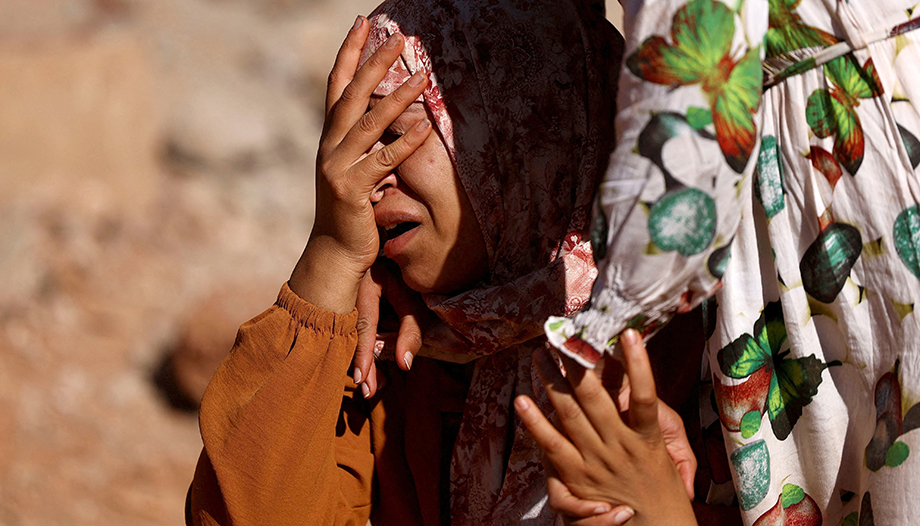I propose an exercise: open your usual newspaper, your favorite news website, turn on your daily radio or television bulletin and you will see how, among the first news, the pain of a mother appears.
I share the ones I found on the day I am writing this article: on the front page, the pain of Nadia, who has seen her 6-year-old son Nadir die under the rubble in the earthquake in Morocco; below, that of Emanuel's mother, who has just received the news that Maritime Rescue has suspended the search for her missing son; and finally, in the most read news module, the statements of Cristina, who is trying to recover from the suicide of her young son. How much pain is a mother capable of enduring?
Nor are the pains of mothers who don't make headlines small. Take a look at your social circles: your neighbors, your colleagues at work or school, or your family. You are sure to find many, many mothers' pains. Mothers of sick children, of children who do not make ends meet, of children who go through a complicated divorce, who fall into addictions or who do not achieve their goals. Wherever there is a suffering person, there is a suffering mother. If you are one, you know what I'm talking about.
And what about fathers? Don't we fathers suffer? Of course we do, but we do not even come close to the peculiar relationship of a mother with the person she has gestated, whom she has known long before us and whom she has given birth to and breastfed. It is a relationship, literally, endearing; for it is biological, chemical, even genetic, for as I explained in one of my threads, part of the DNA of the children remains in the mother's body until her death. And this is something that we males, no matter how much emotional intelligence we have, cannot experience.
Suffering is very subjective, and I am convinced that there are times when mothers suffer more from their children's pain than they themselves do. Anyone who has had the opportunity to visit a pediatric oncology ward can see how there is much more anguish on the faces of the mothers than on those of the children.
Today we celebrate the liturgical feast of Our Lady of Sorrows in its different versions: Angustias, Amargura, Piedad, Soledad... The day after the Exaltation of the Holy Cross (September 14), we commemorate Mary's sorrow next to the cross of her son.
And I ask myself, which of the two suffered more, the mother or the son? Obviously, the pain caused by such an absolutely inhuman physical torture as the one applied to Jesus is hardly surmountable, no matter how close Mary was to her son; but there is an event in the Passion that may go unnoticed and that is transcendental to understand the level of Mary's suffering. I am referring to the time when Jesus said to his mother, "Woman, there is your son," and then to John, "There is your mother." At that moment, the Lord transferred his very special relationship with Mary to all humanity, represented in the beloved disciple. So it was no longer only the pain of every lash on the back, of every humiliation, of every nail in the hands and feet of her Son that she had to bear; but, as the new mother of the human race, the sorrows of all human beings throughout the centuries fell at once on her shoulders.
This is what we celebrate today: that Maria suffers today, with Nadia, the heartbreak of losing her child Nadir in the earthquake in Morocco; with Emmanuel's mother, the uncertainty of the young man's fate in the middle of the ocean; and with Cristina, the helplessness of not having been able to prevent her son's suicide. Mary, as the mother of all, has taken charge of every last pain that you may have found today in your newspaper or in your news bulletin. Mary is the mistress of all our pain, yours and mine. She never abandons us, no matter how great our sorrow. She does not flee. She remains with us, at the foot of the cross, consoling us, suffering at our side.
So today I have only words of gratitude. Gratitude to God for having taken our sufferings and carried them on his cross; and gratitude for having given us on Calvary to the Mother of the Greatest Sorrow, to the Lady of Our Sorrows, to Our Lady of Sorrows.
Journalist. Graduate in Communication Sciences and Bachelor in Religious Sciences. He works in the Diocesan Delegation of Media in Malaga. His numerous "threads" on Twitter about faith and daily life have a great popularity.








